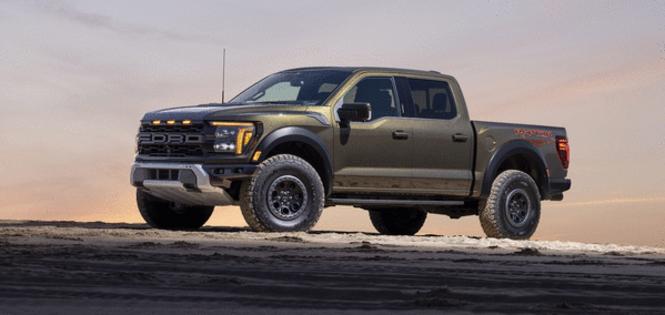Tariffs prompt Ford to adjust shipments to China
Published in Automotive News
Ford Motor Co. has adjusted shipments to China from the United States as a result of retaliatory tariffs, the Dearborn automaker confirmed.
Citing anonymous sources, The Wall Street Journal first reported the Blue Oval this week halted shipments completely of F-150 Raptor pickups, Mustang muscle cars and Bronco SUVs built in Michigan, as well as Lincoln Navigator SUVs made in Kentucky in response to tariffs as high as 150%.
“We have adjusted exports from the U.S. to China in light of the current tariffs,” Ford spokesperson Robyn Jackson said in a statement, without stating which models have been affected.
Ford does import the Lincoln Nautilus SUV into the United States from China. Shipments of that vehicle, however, continue, Jackson confirmed.
The United States and China have traded tariff escalations. China has raised its duties on imported U.S. goods to 125% from 84%. Meanwhile, the United States has imposed a 125% "reciprocal" tariff, though that number was imposed initially by the United States; a 20% tariff imposed over the fentanyl drug trade; and tariffs under Section 301 of the U.S. Trade Act on certain goods between 7.5% and 100%.
Trump's on-again, off-again tariff policy in general has prompted automakers and suppliers to scramble to learn the latest information and limit fallout. Analysts and auto executives have said the increased costs from the import taxes will cut into profits, risk supply chain disruptions, and increase vehicle prices.
"This is the shot across the bow to the White House: They're saying, 'We don’t know the rules of the game, and this is what we have to do for our business,'" said Daniel Ives, analyst at wealth advisory firm Wedbush Securities Inc. "They had to make this move because the tariff situation is untenable. I’d expect GM and others could follow suit. It’s just the beginning. Ford is being preemptive, and it's smart to be cautious in these unprecedent times."
GM spokesperson Kevin Kelly said the Detroit automaker on Friday didn't have any changes to report on its business in China.
Last year, Ford shipped about 5,500 Broncos, F-150s, Mustangs and Navigators to China. These "passion products" of Ford's lineup represent small volumes in China's highly fragmented market, but because it's the largest market in the world, those sales add up on profitable nameplates, Ford executives have said.
"They probably decided it’s too cost prohibitive right now and they are probably hoping a tariff deal gets worked out," David Whiston, analyst at financial services firm Morningstar Inc., said in an email. "The vehicles they ship over there are primarily more for wealthy Chinese consumers due to their high-end price points and not a core part of their China strategy."
The automaker sold 400,000 vehicles in China last year, which represents falling sales as the market has become more competitive from domestic players. Ford does manufacture there with partners Changan Automobile Co. Ltd. and parent Jiangling Motors Co. Ltd. But it uses those factories mostly for exports to southeast Asia and South America.
"The best days for China and Ford are in the rearview mirror," Ives said about the effect halting shipments could have on the company's business in China. "It's already been a challenging market. China is a lose-lose situation for Ford, just given tariffs, retaliation and just the Rubix cube they're trying to figure out in the U.S."
Ford Vice Chair John Lawler this week said operating profit from China was about $900 million last year, and he emphasized the company's commitment to remaining a global player.
“Because of the competitive nature of where the Chinese are heading, they're looking to dominate around the world," he said. "And if we get pushed back into just operating here in the United States and being a U.S. automaker, you know, large profit, but where does that put us as a company in 10 to 15 years?
“We have to compete,” he continued. “And we have to learn to compete globally against the best that are out there, and that's what we’re doing.”
©2025 www.detroitnews.com. Visit at detroitnews.com. Distributed by Tribune Content Agency, LLC.








Comments